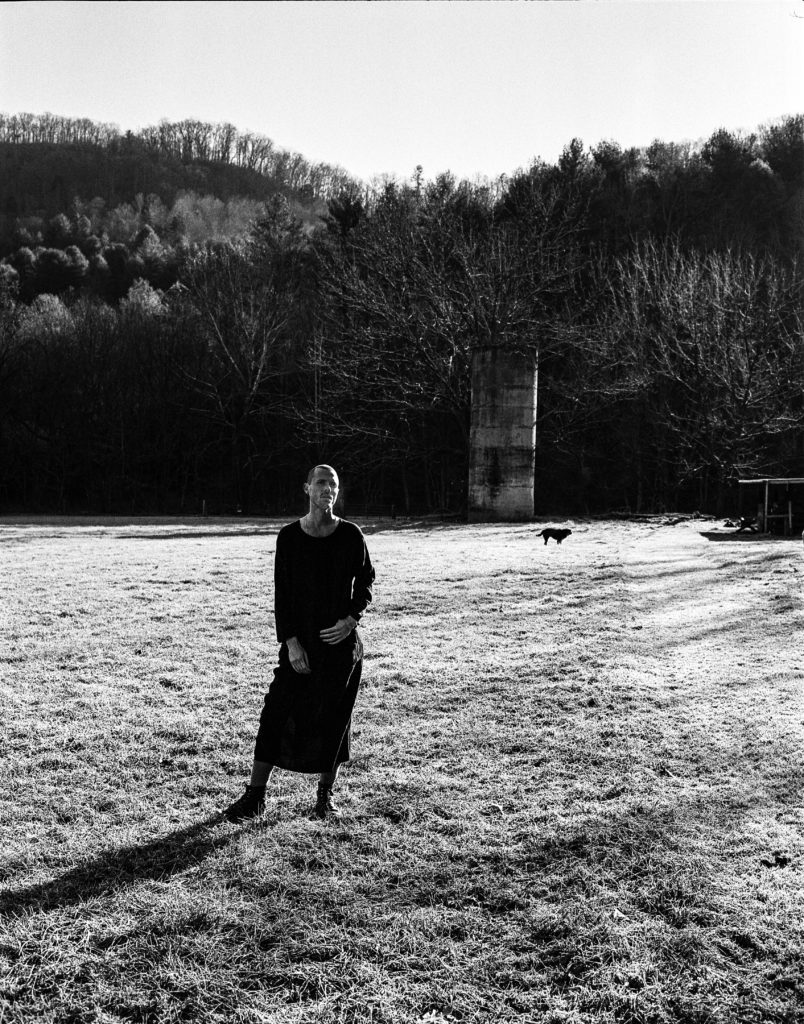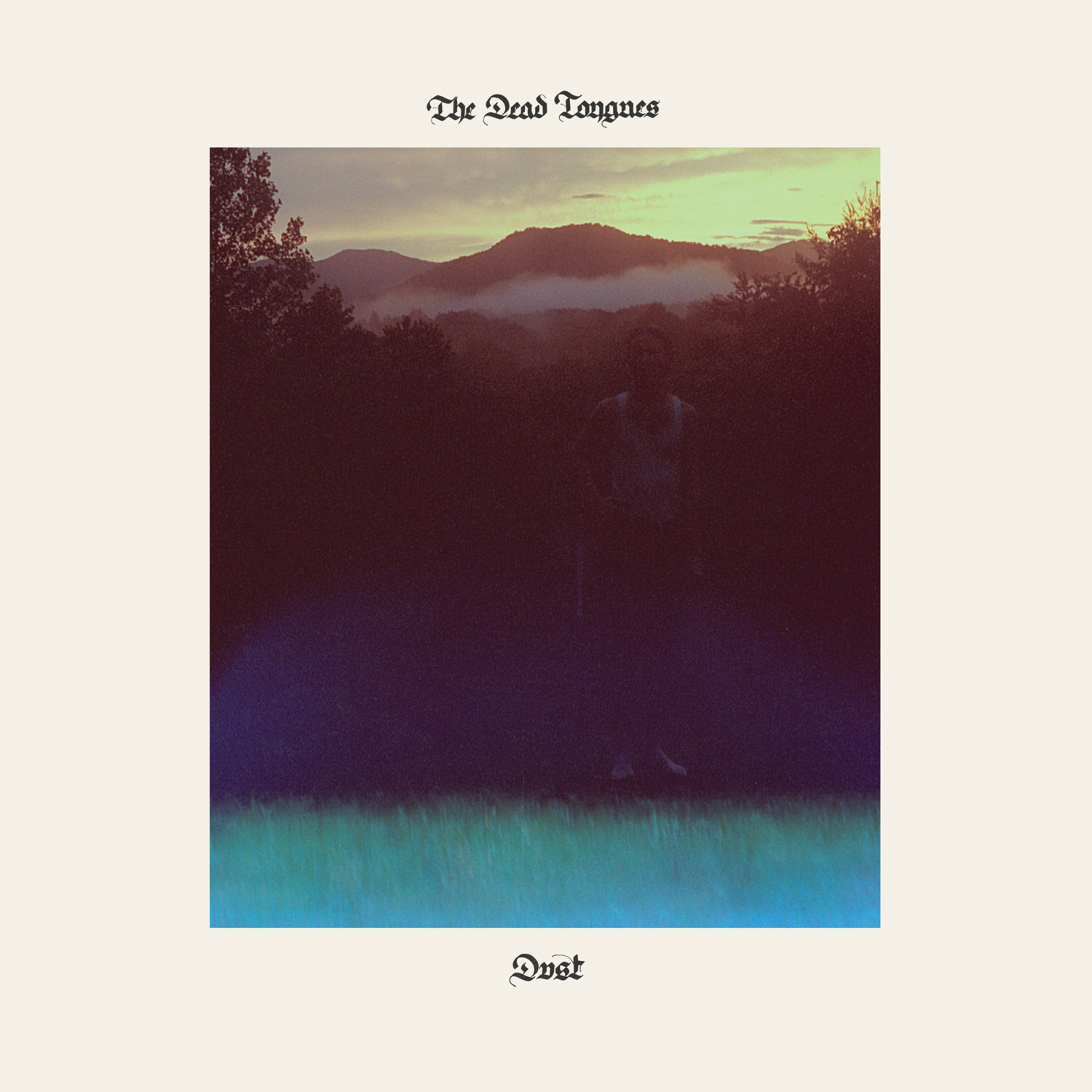Dust: An Essay by Ashleigh Bryant Phillips
March 30, 2022 - By Ashleigh Bryant Phillips
Ryan suggested we meet up at an Eastern tea room for lunch. I was in Asheville to interview him about his latest album, Dust, which, to me, sounded like sun coming down through autumn branches, warm river rocks. Kinda like a healing balm. Folk ballads and hymns about memories, spinning wheels, and heaven. And Ryan’s voice— so unassuming and calm. I could never imagine him yelling in his life. But what did I know? I’d never met him before.
All I knew was Ryan Gustafson of The Dead Tongues had been making music in the North Carolina scene for over a decade. He bounced between Durham and Asheville. At one point I heard he was living in a van in the woods. He’d toured the world as a guitarist for Hiss Golden Messenger and Phil Cook. And throughout all this, he’d constantly put out albums. Despite none of them being “commercially successful,” he couldn’t do anything else. My musician friends told me he was quiet, slow to open up, kept to himself at parties.
And here he was, sitting across from me in the tea room. Only answering my smalltalk introductory questions and offering nothing more. Then he said, “You’re welcome to have some of my kitchari.”
Next thing I knew Ryan was inviting me to his cabin. His van had a crack in the windshield, dried flowers on the dash, but the engine was loud and I had to lean in to hear him. He told me about how he was trying to get healthcare, how he grew up poor–the son of a Pentecostal preacher. “Everything we had was given to us,” he said. “That’s how I got my first guitar.” He drove us outside of Asheville, to a lil township in the Newfound Mountains. We passed a Dollar General, some double wides. As we wound around curves, he told me how everyone he knew growing up was able to speak in tongues. And how it had never happened for him. “I thought it meant I wasn’t good enough,” he said.
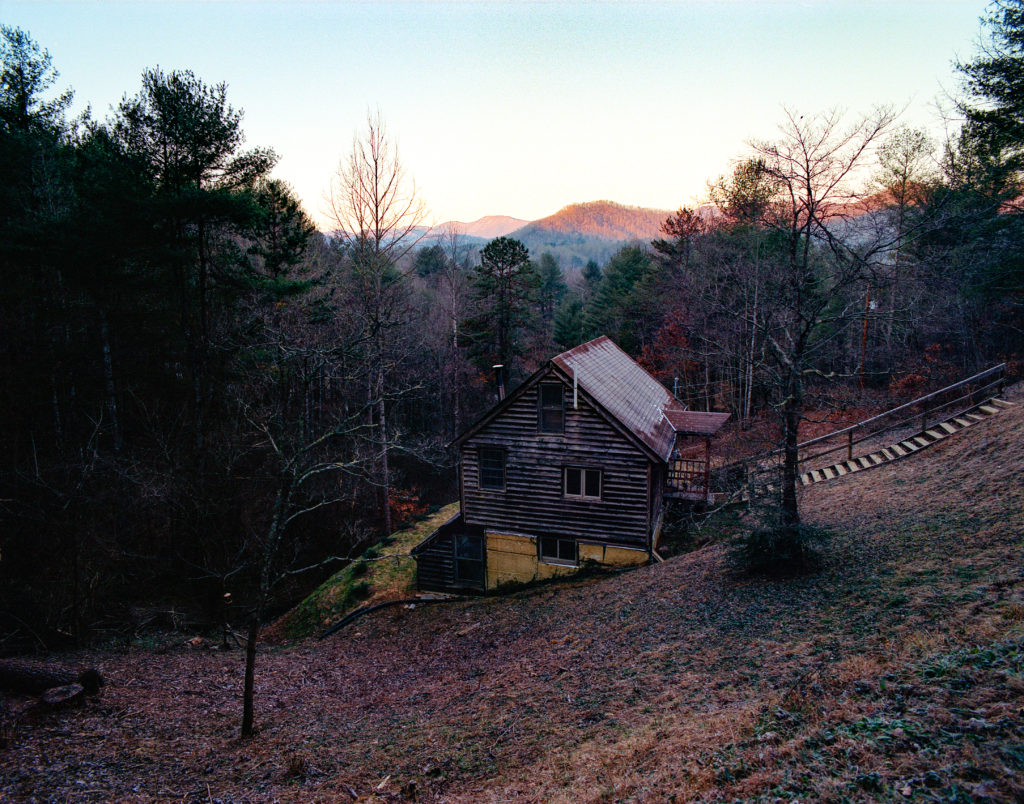
His cabin was back off the main road, about a mile or so up this dirt path, the kinda drive only an SUV or truck could make it through. He lived in the middle of a former Sufi farm. His neighbors down the hill raised sheep, chicken, and peacocks. They were all strutting and eating in the yard. But when we got to the cabin at the top of the hill, everything was quiet and still. Trees went on forever in every direction but not even a bird made a sound.
“I reckon it’s so quiet out because it’s winter, no birds hanging out in the bare branched trees,” I said.
“Yeah, I like it though,” Ryan said. “With all the leaves gone, you can see the poses the trees make. They’re all different.” He pointed to a dogwood beside the cabin, “This one looks like it’s doing a kung fu move like this.” He imitated the movement, placed his legs wide, and curled his arm above him like the neck of a swan.
“Never thought about it that way,” I said.
“Me either…not until I stopped playing music. When I stopped playing music I learned a new way to see.”
I didn’t really know how to respond. He was standing next to a stack of firewood. It was almost as tall as him. I asked him if he chopped all that wood and he nodded.
Inside his cabin, Ryan told me what he really meant. “I was fed up with what being a musician had turned into and I just wanted to stop.” That was in the summer of 2020, when the pandemic had given him all the time in the world to create the best work of his life. But instead of picking up instruments, Ryan created trails in the forest around his cabin, mapping them out in his memory.
“I got to the point where I was okay with never even returning to music,” he said.
“Didn’t that scare you?”
“No.”
At this point in the story, Ryan took me into his studio. It was basically a little lean-to room built off the side of the cabin. There was a skylight and the way the afternoon sun came in, I couldn’t help but think of church windows. And yeah there were instruments all around—I think I saw a twelve-string and a banjo—but Ryan didn’t say anything about them. Instead, he took a black and white photo off the wall. He told me they were his Swedish ancestors, the photo taken shortly before they’d immigrated. Men and women posing for a band portrait. Then he showed me a picture of him and Bruce Hornsby. “You know he played with the Grateful Dead?” he said. I had no idea.
But it was Ryan’s writing desk that caught my attention. It was piled with books (Octavia Butler, Layli Long Soldier, Wendell Berry), a typewriter, and what looked like a thick work-in-progress.
“Damn,” I said, pointing to the stack, “What’s this?”
“Oh, just some stream of consciousness stuff, about trees.”
“So when you weren’t playing music you were also writing a manuscript?”
“Yeah.”
After five months of not picking up an instrument, Ryan wanted to get rid of everything that was tied to his identity as a musician. He even thought about changing his name. He was getting ready to throw out old notebooks packed with years of material but, for some reason, he decided to stop and go through them, just to see if there was anything worth saving. And sure enough, he found some images and lyrics, threads from former selves he didn’t want to lose.
That night I listened to the album again. Here’re some of my notes:
“Pawnshop Dollar Bills”—sprawling, bluesy. “I’m burning in a fire everything I own…I’m golden.” Bendy electric guitar solo. Harmonica soars. Traveling sparrow.
“Colorful Crosses” narrative meditation on life’s fragility, lyrics work like a short story. Everything hinges on an image.
“Ticket” Trying to repair a ‘73 VW bus. Nothing but a wobbly piano. Primal chorus. The joy of a sinner who’s just been forgiven. A light shining down on him.
Dust—reckoning, discovery, never losing faith.
His best work to date. Unfettered, free.
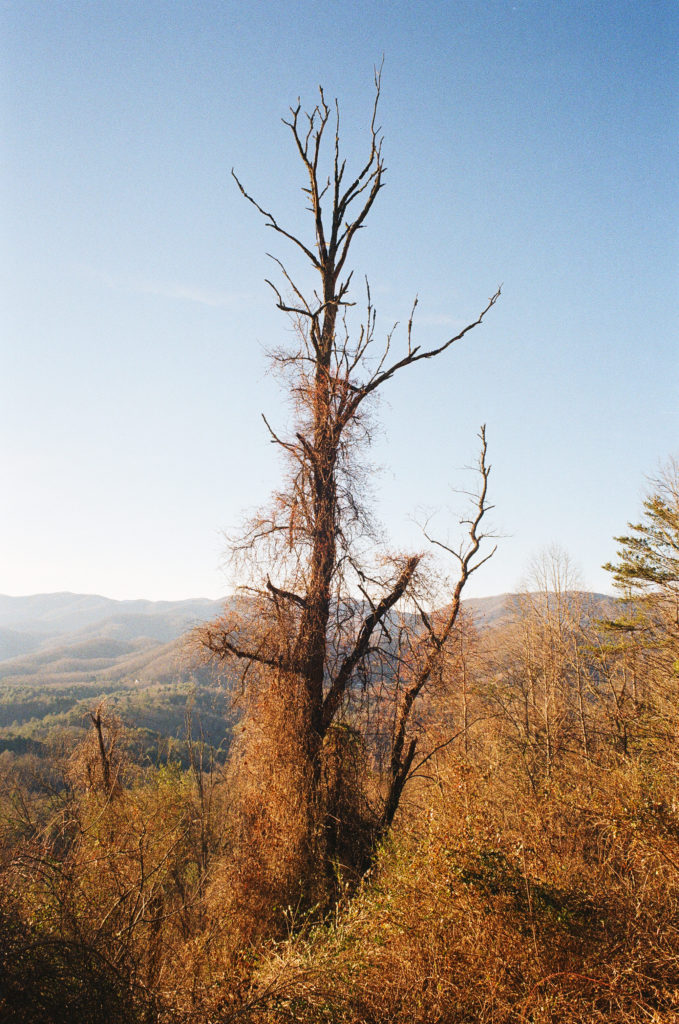
The next day me and Ryan met up back in town at Malaprops Bookstore. We were looking for stories by Kenji Miyazawa (an 18th century-born Nichiren Buddhist) whose main characters range from reliable cranes to dahlias. But we found Jonathan Williams instead, an Asheville poet who transcribed Smoky Mountain road signs and published much of his own work on his small literary press, Jargon Society. Critics said he helmed “found language” and I imagined the church Ryan grew up in, everyone speaking divine syllables only angels understood.
“The name The Dead Tongues is a nod to your raising, right?” I asked him.
“Yes,” he said. “But also, at the time, I thought it sounded really cool.”
We both laughed.
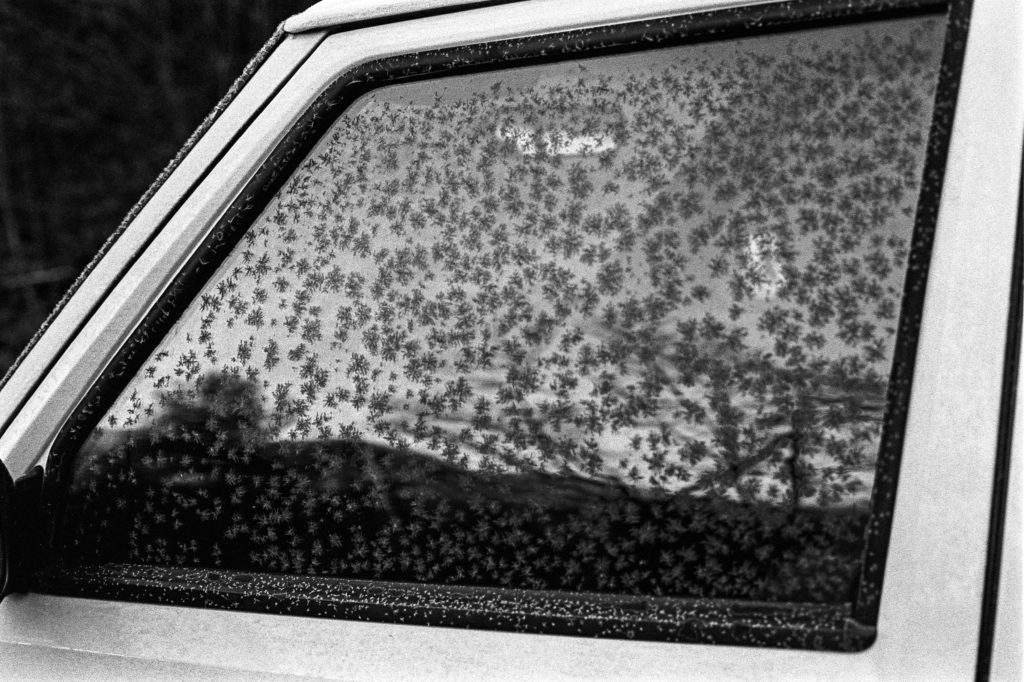
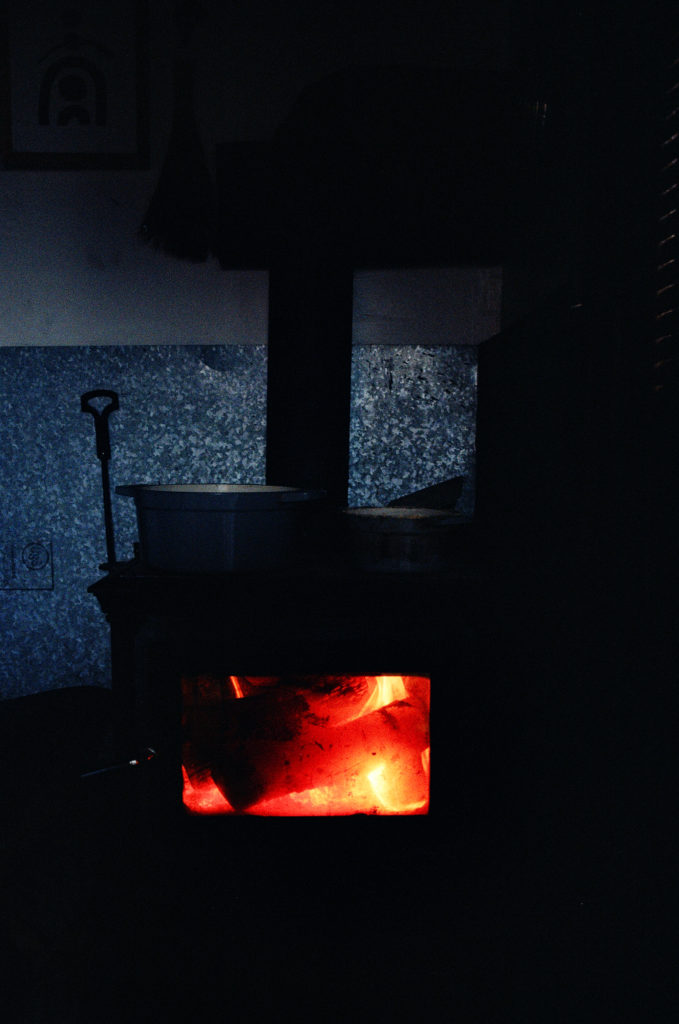
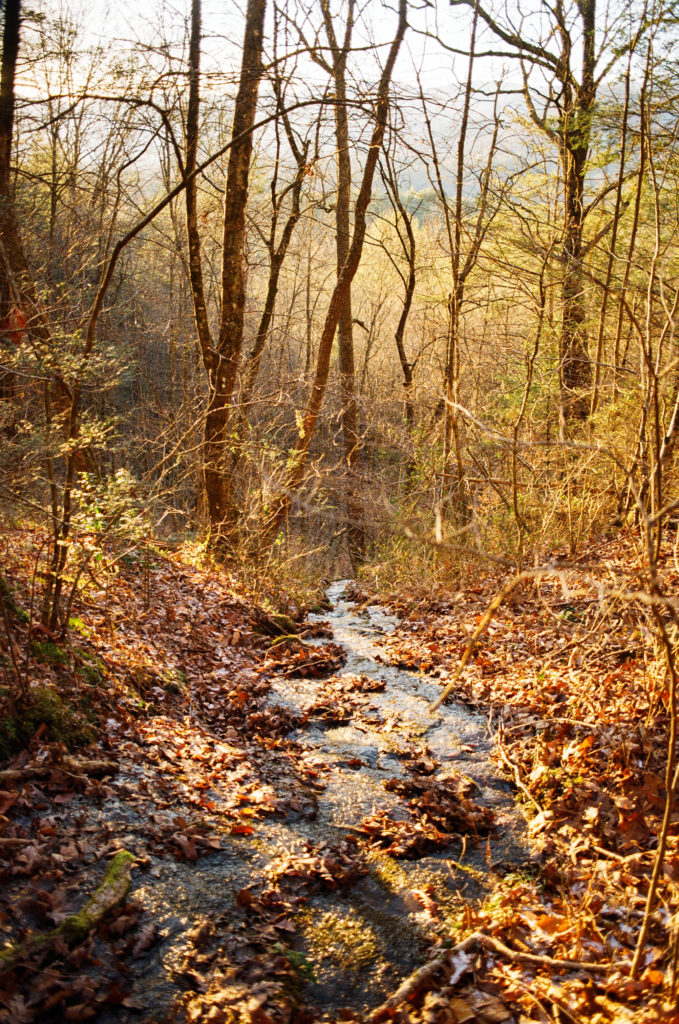
Then Ryan drove us to a secluded coffee shop on the French Broad so I could officially interview him with a recorder. Learn the buzzy promo details that Spotify and Pitchfork, and record stores would want to know about Dust. It wasn’t until we were sitting together by the river that I noticed he was wearing the same clothes as the day before. It was bright out and cold. The water reflected in our eyes.
ABP: How long did Dust take to record?
RG: About nine days. The fastest I’ve recorded anything. The quickest I’ve ever written an album too. It used to take me months to finish a song. But this was different.
ABP: You weren’t so hard on yourself this time.
RG: Yeah. I wanted to have fun.
ABP: Where was it recorded?
RG: Betty’s in Durham
ABP: And you played…
RG: Guitars, Harmonica, Piano. Joe Westerlund was on drums. Andrew Marlin was on mandolin. Alexandra Sauser-Monnig and Molly Sarle did some backing vocals. Josh Moore too. Allyn Love played the pedal steel and Alex Bingham was on bass.
ABP: What’s the track you’re most proud of?
RG: “Ticket.” I recorded it the last night of my studio session after everyone had gone home. It was like 2 am. It’s one of the only new songs I wrote for the album. I felt like I was doing something I’ve never done before. And I love the metaphor. Phil Cook gave me the VW bus and I thought I could fix it and solve all my problems.
ABP: You were trying to repair it yourself?
RG: Yeah, I watched a lot of Youtube videos.
ABP: How would you suggest someone listen to Dust?
RG: I like the idea of people listening to it while they’re taking a night drive.
ABP: If you had to pinpoint an overarching theme that you were going for with the album, what would it be?
RG: Have you ever heard of Yamadori? It’s the Japanese practice of harvesting little trees from the forest. I got really into that when I stopped playing music. And it’s pretty hard. I collected five trees and two actually survived.
ABP: This is incredible. Which ones survived?
RG: A beech and a pine. I’ve heard that the pine is really difficult so I was really proud of that. The next step is learning about Bonsai. But this idea of uprooting and rebirth and cycles and the past informing the future and the future informing the past. There is no single story. Everything is connected.— ASHLEIGH BRYANT PHILLIPS, 2022
